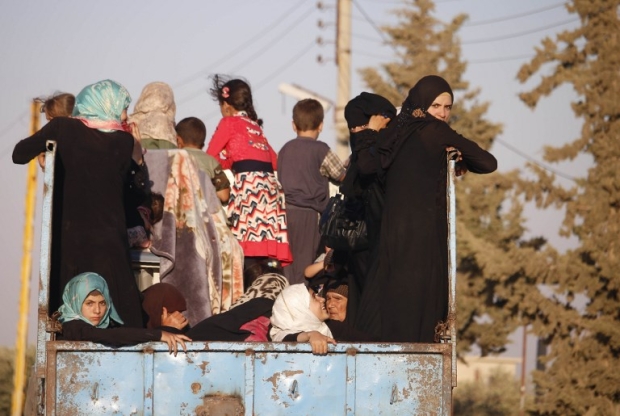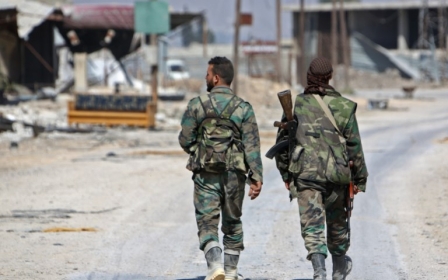Russia's strategy in Syria shows how to win a Middle East war

DAMASCUS - During the height of the US-led wars in Afghanistan and Iraq, the common buzzword among the US military and the pundits analysing the wars was counterinsurgency.
The much-feted generals, David Petraeus and Stanley McChrystal, gave briefing after briefing on how to win through unconventional tactics. Their strategy was to think like the insurgents, capture their space and deny them physical and moral support. Yet for more than a decade Iraq and Afghanistan have remained firmly out of the US sphere of influence, with both countries still far from secure and the US military having to rely on regional countries for survival.
In Syria, however, the Russians are now demonstrating Machiavellian skills that are defining what success looks like on the battlefield. For the first time in modern history, a foreign military intervention has triumphed in the Middle East.
Daraa campaign
As the Syrian army closes in on Daraa, the final chapter in the Russian-led campaign is taking shape. But what is happening in Daraa? Is it the same as in Eastern Ghouta, Homs and Aleppo?
Daraa cannot be looked at in isolation. It is a microcosm of the Syrian war ever since the Russians entered the fray.
The Russians have stepped in and won an outright victory, making them the ultimate kingmakers not just in Syria, but also the wider Middle East
US-led military interventions in the Middle East - ranging from Libya to Yemen, Iraq and Afghanistan - have all resulted in catastrophic failures. The Americans handed Iraq to Iran after the overthrow of Saddam; in Libya they handed over the desert to brutal terrorist groups and strongmen; and in Yemen their former ally Ali Abdullah Saleh was driven out and killed. Meanwhile, in Egypt and Gaza, democracy was denied with full US support.
It is no surprise then that amid such glaring failures and contradictions in policy, the Russians have stepped in and won an outright victory, making them the ultimate kingmakers not just in Syria but also the wider Middle East.
Leaders such as Egypt's Abdel Fattah al-Sisi, Saudi Arabia's Mohammed bin Salman and Turkey's Recep Tayyip Erdogan are now cosying up to Moscow to deliver them from the mess the US created.
Even the US president is lining up a summit with Russian President Vladimir Putin, where Syria will be a significant talking point. So the Russians have outmanoeuvred not just the Americans but erstwhile opponents, such as Turkey and Saudi Arabia.
A repeat strategy
The Russians stepped in to help the Syrian government and military in 2015 and immediately started cutting deals with various armed groups, irrespective of their backers' positions. At the same time, they used overwhelming military airpower to pound the rest into submission, and took over the command-and-control structure to make the Syrian military and state infrastructure more efficient and capable.
Analysts who predicted the demise of Syrian President Bashar al-Assad were clearly in the wrong. Despite severe setbacks, including the loss of top defence and security officials in a bombing, Syria’s military and intelligence had assets all over the country which were able to penetrate the rebel and extremist groups.
At the same time, a request had been made to the Russians to come in and help a counterattack - and counterattack they did. Starting from Homs, the left-behind apparatus of the security state went into action and cut deals with armed groups, bartered for essential goods, manned joint checkpoints and eliminated those who refused to negotiate.
Homs became the first successful evacuation monitored by the Russians. Rebels would be transported to the north or Ghouta and territory would be seized. Then came Aleppo and Eastern Ghouta which were repeats of the same strategy. Russian firepower coupled with Syrian intelligence cutting deals, just as they had done in the heyday of the Lebanese and Iraqi wars.
Turkey was brought on board with the threat of "either support the Russian-led process or face a Kurdish insurgency backed by the NATO allies of Turkey". Key Arab countries like Egypt, Algeria, the UAE and Oman were brought in as the Sunni Arab countries that now supported Damascus in its quest to finish off the rebels.
The Russians also used its own Sunni Muslim officers and military police to talk directly to the mostly Sunni leadership of the various rebel groups. And in the most remarkable diplomatic success, Israel was neutralised too – "they were told by the Russians you either deal with us or the Iranians, we can remove Iran from the south" – and they did.
Syria's endgame
Probably the most quoted Syrian military analyst, Danny Makki, who has been embedded with the top Western media outlets and the Syrian military simultaneously throughout the war, said recently on TRT World, "that it was no surprise that Daraa fell – it was a matter of time". Like in Homs, Aleppo and Ghouta, the Russian and Syrians made the Jordanians believe that it was far better for Damascus to be in control than the rebels.
Jordan, facing its own existential economic crisis, is no longer in a mood to fight Damascus. Israel, which has supported the rebels according to the UN forces not far from Daraa, has also given in to its opposition to Damascus retaking the border.
Iran has successfully been moved out of the south in a deal that keeps Tel Aviv at bay. The Americans are in talks to dismantle bases in Syria in return for a reduction of the Iranian footprint.
The Trump-Putin summit could finalise the deal over the fate of the Syrian "end-game". And despite the outcry over Daraa by opposition groups and the UN, the main regional protagonists Saudi Arabia and Turkey are less interested in its fate, and keen on a deal with Moscow.
Grudgingly, the UN and other international outlets such as Chatham House, the BBC and Economist are now writing that hundreds of thousands of refugees are returning to government-held areas and that in government-held cities there is a normalcy and no shortage of food, water, power or basic amenities.
The Russians have used to full advantage an entrenched Syrian state that despite its retreat never disappeared, with the old deal-making of the late president Hafez al-Assad making a stunning comeback. Syrian counterinsurgency led by the Russians and Assad did what the Americans failed to do – provide the state's essential services and an ability to outfox the enemy both domestic and foreign.
And even before the dust has settled in Daraa, thousands of refugees are returning to Daraa as the Syrian government returns normalcy after weeks of intense fighting and displacement.
It is almost certain Trump has no interest left in Syria; the US embassy gave clear messages to the rebels in the south that they were on their own.
Russia and President Assad have - piece by piece - retaken territory and convinced their rivals that it is not worth fighting or holding out against the Syrian Arab Republic.
Despite the calls to carry on the fight against Assad, the thousands of refugees returning to Homs, Aleppo and even Daraa are testament that Damascus has convinced them otherwise.
- Kamal Alam is a visiting fellow at the Royal United Services Institute (RUSI). He specialises in contemporary military history of the Arab world and Pakistan, he is a fellow for Syrian affairs at the Institute for Statecraft, and is a visiting lecturer at several military staff colleges across the Middle East, Pakistan and the UK.
The views expressed in this article belong to the author and do not necessarily reflect the editorial policy of Middle East Eye.
Photo: A Syrian woman walks with a boy past a banner showing Russian President Vladimir Putin (R) shaking hands with Syrian President Bashar al-Assad, after arriving in a convoy carrying displaced people into government-controlled territory at Abu al-Zuhur checkpoint in the western countryside of Idlib province, on 1 June 2018. (AFP)
This article is available in French on Middle East Eye French edition.
Stay informed with MEE's newsletters
Sign up to get the latest alerts, insights and analysis, starting with Turkey Unpacked
Middle East Eye delivers independent and unrivalled coverage and analysis of the Middle East, North Africa and beyond. To learn more about republishing this content and the associated fees, please fill out this form. More about MEE can be found here.






